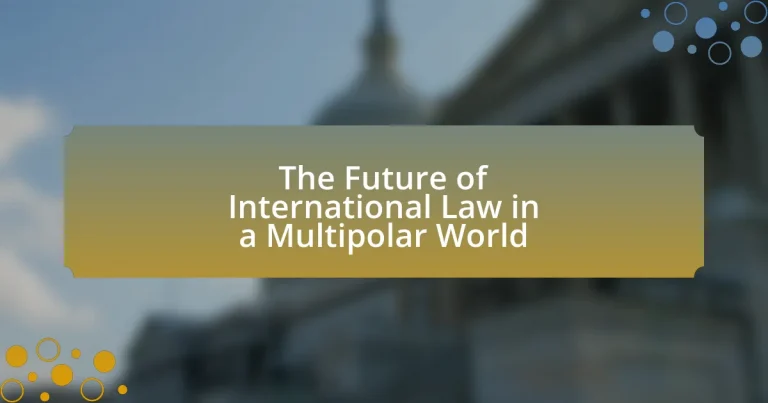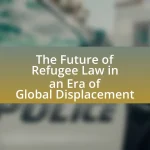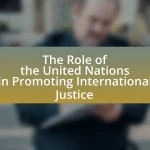The article examines the future of international law in a multipolar world, highlighting the complexities and challenges arising from the distribution of power among multiple states. It discusses how this shift impacts legal frameworks, leading to diverse interpretations and fragmented agreements, particularly in areas such as trade, human rights, and environmental regulations. Key trends include the rise of regionalism, the influence of non-state actors, and the need for adaptive legal responses to global challenges like climate change and cybersecurity. The article emphasizes the importance of collaboration and inclusive dialogue among nations to strengthen international law and address the implications of emerging powers and technological advancements.
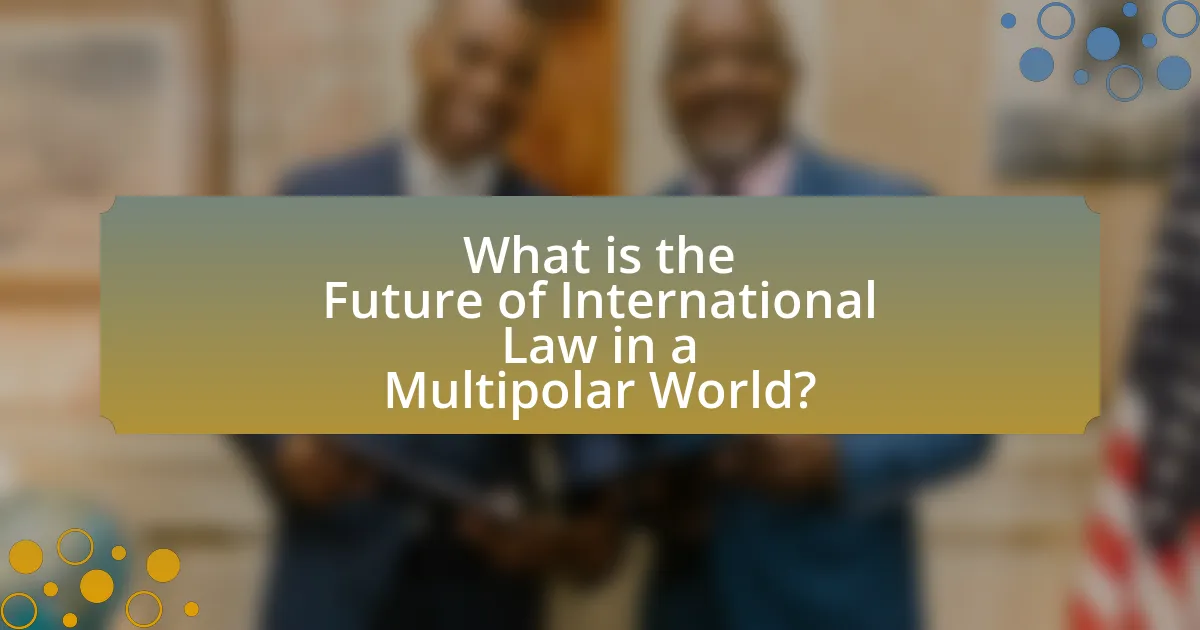
What is the Future of International Law in a Multipolar World?
The future of international law in a multipolar world is characterized by increased complexity and competition among states. As power becomes more distributed among various nations, international law will likely evolve to address diverse interests and perspectives, leading to a more fragmented legal landscape. This shift is evidenced by the rise of regional agreements and the growing influence of non-state actors, which challenge traditional state-centric legal frameworks. Additionally, the emergence of new global challenges, such as climate change and cybersecurity, necessitates adaptive legal responses that reflect the multipolar dynamics of international relations.
How does a multipolar world impact international law?
A multipolar world significantly impacts international law by increasing the complexity of legal frameworks and the negotiation processes among states. In a multipolar system, multiple powerful states influence international norms and rules, leading to a diversification of legal interpretations and applications. For instance, the rise of countries like China and India has introduced alternative perspectives on issues such as trade, human rights, and environmental regulations, challenging the dominance of Western legal paradigms. This shift can result in fragmented legal agreements and varying compliance standards, as seen in the differing approaches to climate change agreements between developed and developing nations. Consequently, international law must adapt to accommodate these diverse interests and power dynamics, fostering a more pluralistic legal environment.
What are the defining characteristics of a multipolar world?
A multipolar world is characterized by the distribution of power among multiple states or entities, rather than being dominated by a single superpower. This structure leads to increased diplomatic engagement, where various nations exert influence and collaborate on global issues, such as climate change and trade. For instance, the rise of countries like China, India, and the European Union alongside the United States illustrates this shift, as these entities engage in strategic partnerships and negotiations that reflect diverse interests and perspectives. Additionally, a multipolar world often results in a more complex international legal landscape, as multiple legal frameworks and norms emerge to accommodate the varied interests of these influential states.
How does the shift from unipolarity to multipolarity affect legal frameworks?
The shift from unipolarity to multipolarity significantly affects legal frameworks by introducing diverse legal norms and practices that reflect the interests of multiple global powers. In a unipolar world, international law was largely shaped by the dominant power, primarily the United States, which influenced treaties, conventions, and customary laws to align with its political and economic interests. However, as power becomes more distributed among various states, such as China, the European Union, and emerging economies, legal frameworks must adapt to accommodate differing perspectives on sovereignty, human rights, and trade regulations.
For instance, the rise of China has led to alternative legal interpretations, particularly in areas like trade and investment, where its Belt and Road Initiative promotes different standards compared to Western norms. This diversification can lead to conflicts in legal interpretations and enforcement, as seen in disputes over territorial claims in the South China Sea, where international law is challenged by regional practices. Consequently, the evolution of legal frameworks in a multipolar world necessitates greater negotiation and collaboration among states to create a more inclusive and representative international legal system.
Why is the evolution of international law important in a multipolar context?
The evolution of international law is crucial in a multipolar context because it facilitates cooperation and conflict resolution among diverse global powers. As multiple states gain influence, the need for a legal framework that accommodates varying interests and promotes stability becomes essential. Historical instances, such as the establishment of the United Nations and the development of treaties like the Paris Agreement, illustrate how evolving international law has enabled nations to address collective challenges, such as climate change and security threats, thereby fostering a more balanced global order.
What challenges does international law face in a multipolar world?
International law faces significant challenges in a multipolar world, primarily due to the divergence of interests among multiple powerful states. This fragmentation leads to inconsistent application and enforcement of international norms, as countries prioritize their national interests over collective agreements. For instance, the rise of non-Western powers like China and India has resulted in competing legal interpretations and practices, undermining the universality of international law. Additionally, the lack of a central authority to enforce compliance exacerbates issues such as human rights violations and territorial disputes, as seen in the South China Sea conflict. These dynamics complicate diplomatic negotiations and hinder the effectiveness of international institutions, making it increasingly difficult to achieve consensus on global issues.
How can international law adapt to new power dynamics?
International law can adapt to new power dynamics by incorporating flexible frameworks that recognize the rise of non-state actors and regional powers. This adaptation involves revising existing treaties and creating new agreements that reflect the interests and influence of emerging nations, such as those in Asia and Africa, which are increasingly asserting their roles on the global stage. For instance, the Paris Agreement on climate change demonstrates how international law can evolve to include diverse stakeholders, allowing for varied commitments based on national capacities. Additionally, the establishment of forums like the G20 illustrates a shift towards multilateralism that accommodates a broader range of voices in decision-making processes. These examples underscore the necessity for international law to remain relevant and effective in a multipolar world by being inclusive and responsive to changing geopolitical realities.
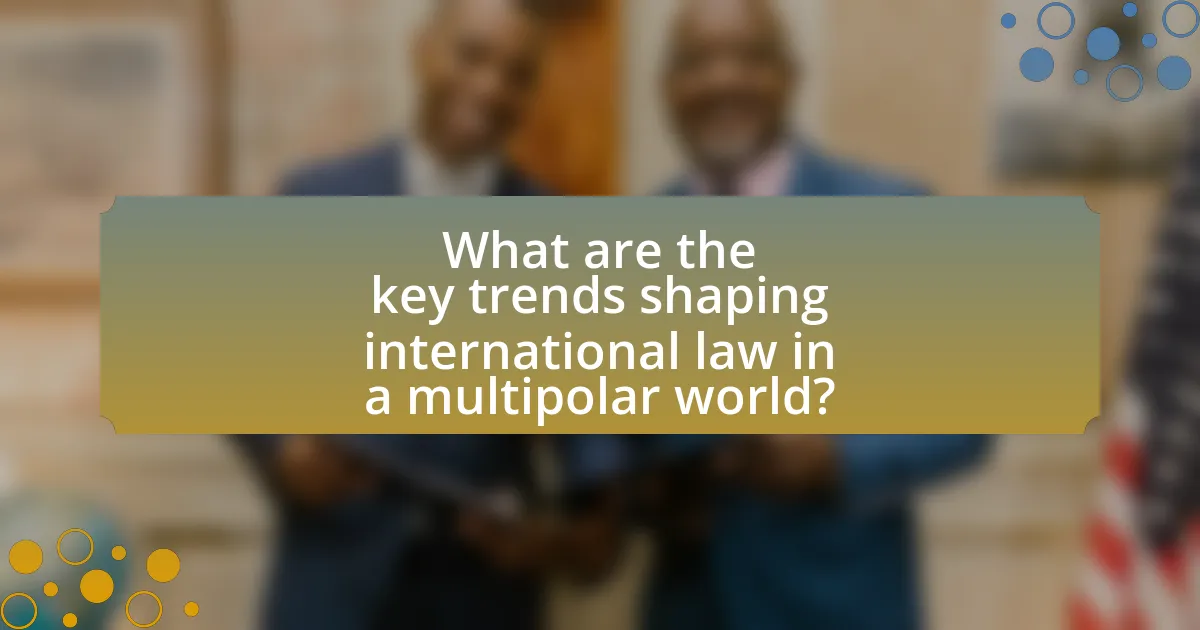
What are the key trends shaping international law in a multipolar world?
Key trends shaping international law in a multipolar world include the rise of regionalism, the increasing influence of non-state actors, and the evolution of international norms. Regionalism is evident as countries form alliances and trade agreements that reflect their geopolitical interests, such as the African Union and ASEAN, which influence legal frameworks within their regions. The influence of non-state actors, including multinational corporations and NGOs, is growing, as they play significant roles in shaping policies and legal standards, particularly in areas like human rights and environmental law. Additionally, the evolution of international norms is marked by a shift towards more inclusive and participatory governance structures, as seen in the adoption of the Sustainable Development Goals, which reflect a collective commitment to address global challenges. These trends indicate a dynamic landscape for international law, adapting to the complexities of a multipolar world.
How are emerging powers influencing international legal norms?
Emerging powers are influencing international legal norms by actively participating in the creation and reform of global governance frameworks. Countries such as China, India, and Brazil are advocating for a multipolar approach that reflects their interests and perspectives, challenging the dominance of Western-centric legal standards. For instance, China’s Belt and Road Initiative has led to the establishment of new trade agreements and investment treaties that incorporate different legal principles, thereby reshaping international economic law. Additionally, India has pushed for reforms in international institutions like the United Nations to enhance representation for developing nations, which alters the dynamics of international law-making. These actions demonstrate that emerging powers are not only adopting existing norms but also contributing to the evolution of legal frameworks that better align with their geopolitical and economic realities.
What role do regional organizations play in shaping international law?
Regional organizations play a significant role in shaping international law by creating legal frameworks that address regional issues and promote cooperation among member states. These organizations, such as the European Union and the African Union, develop treaties, regulations, and protocols that influence both regional and global legal standards. For instance, the European Union’s legal system has established principles that have been adopted in various international agreements, demonstrating how regional norms can impact broader international law. Additionally, regional organizations often serve as platforms for dispute resolution and collective action, further embedding their legal frameworks into the international legal landscape.
How do cultural differences impact the development of international law?
Cultural differences significantly impact the development of international law by influencing the values, norms, and priorities that shape legal frameworks. For instance, varying cultural perspectives on human rights can lead to divergent interpretations and implementations of international treaties, such as the Universal Declaration of Human Rights, which reflects Western ideals but may not align with the views of non-Western societies. Additionally, cultural attitudes towards sovereignty and state intervention can affect consensus-building in international negotiations, as seen in the differing approaches to humanitarian intervention between Western and non-Western nations. These cultural variances necessitate a more inclusive dialogue in international law-making processes to accommodate diverse viewpoints and foster global cooperation.
What technological advancements are affecting international law?
Technological advancements such as artificial intelligence, blockchain, and cybersecurity are significantly affecting international law. Artificial intelligence is transforming legal research and decision-making processes, enabling faster and more accurate analysis of legal texts and case law. Blockchain technology is enhancing transparency and security in international transactions, particularly in areas like trade and intellectual property, by providing immutable records. Additionally, advancements in cybersecurity are prompting the development of new legal frameworks to address issues related to data protection, privacy, and cybercrime, as states and organizations navigate the complexities of digital interactions. These technologies are reshaping the landscape of international law by necessitating updates to existing legal frameworks and the creation of new regulations to address emerging challenges.
How does digitalization challenge traditional legal frameworks?
Digitalization challenges traditional legal frameworks by introducing complexities that existing laws are often ill-equipped to address. For instance, the rapid growth of digital platforms and technologies, such as blockchain and artificial intelligence, creates new legal scenarios that existing regulations do not cover, leading to gaps in accountability and enforcement. A specific example is the difficulty in applying jurisdictional laws to online transactions that cross international borders, as highlighted by the European Union’s General Data Protection Regulation, which aims to protect data privacy but faces challenges in enforcement across different legal systems. This mismatch between the pace of technological advancement and the slower evolution of legal frameworks necessitates a reevaluation of how laws are structured and enforced in a digital context.
What are the implications of artificial intelligence on international law?
Artificial intelligence significantly impacts international law by introducing challenges related to accountability, jurisdiction, and compliance. The rise of AI technologies complicates the attribution of responsibility for actions taken by autonomous systems, leading to legal ambiguities regarding liability in cases of harm or misconduct. For instance, the use of AI in military applications raises questions about the legality of autonomous weapons under international humanitarian law, as existing frameworks may not adequately address the complexities of machine decision-making. Furthermore, the global nature of AI technology necessitates international cooperation to establish regulatory standards, as disparate national laws could lead to conflicts and enforcement difficulties. The European Union’s General Data Protection Regulation exemplifies efforts to create a cohesive legal framework, but similar initiatives are needed worldwide to address the implications of AI on privacy, data protection, and human rights.
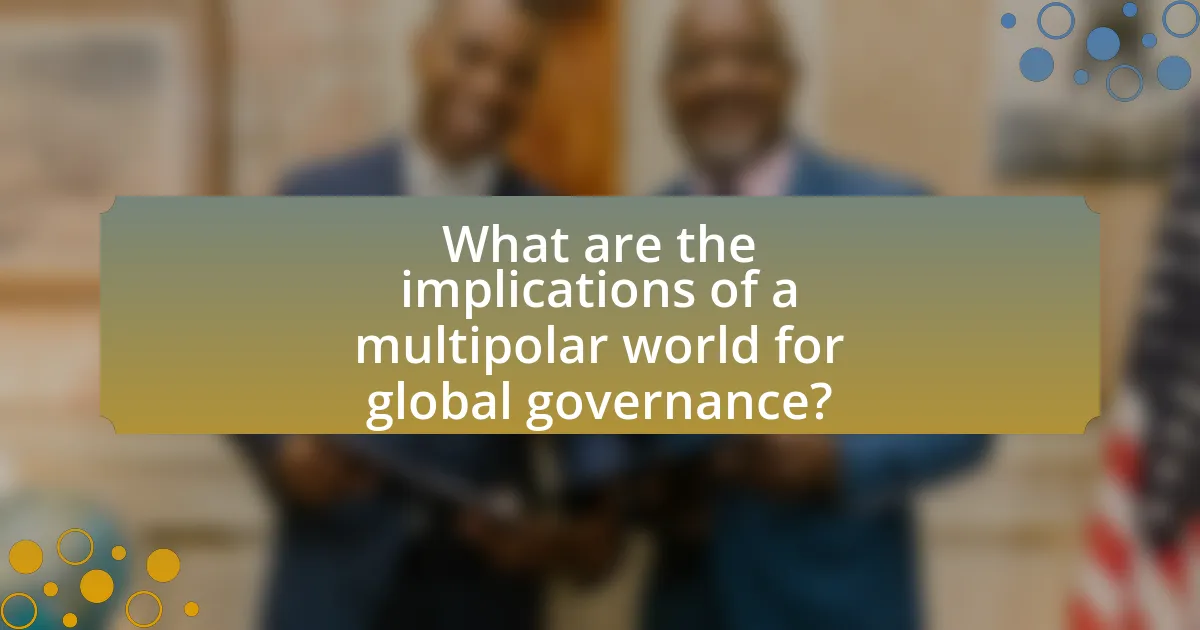
What are the implications of a multipolar world for global governance?
A multipolar world implies a shift in global governance dynamics, leading to increased complexity and competition among multiple power centers. In this context, traditional Western-dominated institutions may face challenges as emerging powers assert their influence, potentially resulting in a fragmentation of international norms and standards. For instance, the rise of countries like China and India has already begun to reshape discussions on issues such as climate change and trade, as these nations advocate for alternative frameworks that reflect their interests. This shift can lead to a more pluralistic approach to governance, where diverse perspectives are considered, but it may also complicate consensus-building and enforcement of international agreements, as seen in the varied responses to the Paris Agreement.
How does a multipolar world affect international cooperation?
A multipolar world affects international cooperation by creating a more complex landscape for diplomacy and collaboration among nations. In a multipolar system, power is distributed among multiple states rather than being dominated by one or two superpowers, which can lead to both opportunities and challenges for international cooperation. For instance, diverse interests and priorities among various global actors can result in fragmented alliances and competing agendas, making consensus on international issues more difficult. Additionally, the rise of regional powers can shift the focus of international cooperation from global governance to regional or bilateral agreements, as seen in the increasing influence of countries like India and Brazil in international forums. This dynamic can hinder the effectiveness of multilateral institutions, as seen in the challenges faced by the United Nations in addressing global crises.
What are the potential benefits of increased multipolarity for global governance?
Increased multipolarity can enhance global governance by promoting diverse perspectives and collaborative decision-making. This shift allows for a more balanced representation of interests among nations, reducing the dominance of any single power and fostering inclusivity. For instance, the rise of emerging economies has led to the establishment of platforms like the BRICS group, which emphasizes cooperation among member states on issues such as trade and climate change. This collaborative approach can lead to more equitable solutions that address the needs of a broader range of countries, ultimately strengthening international law and governance frameworks.
What risks does a multipolar world pose for international stability?
A multipolar world poses significant risks for international stability, primarily due to increased competition among multiple power centers. This competition can lead to heightened tensions, as nations may pursue aggressive foreign policies to assert their influence, resulting in conflicts over resources, territorial disputes, and ideological differences. Historical examples include the Cold War, where the bipolar structure led to proxy wars and global instability; similarly, a multipolar environment could foster similar conflicts as nations vie for dominance. Additionally, the lack of a single dominant power may complicate international cooperation on global issues such as climate change and terrorism, as divergent interests can hinder consensus-building.
What strategies can be employed to strengthen international law in a multipolar world?
To strengthen international law in a multipolar world, states can enhance cooperation through multilateral treaties and frameworks that promote shared norms and standards. This approach is evidenced by the success of agreements like the Paris Agreement, which unites diverse nations under common climate goals, demonstrating that collective action can address global challenges. Additionally, fostering dialogue among major powers can mitigate conflicts and build consensus on legal principles, as seen in the United Nations’ role in facilitating discussions on international security and human rights. Strengthening international law also involves empowering international institutions, such as the International Criminal Court, to ensure accountability and uphold justice, thereby reinforcing the rule of law across nations.
How can states collaborate to enhance legal frameworks?
States can collaborate to enhance legal frameworks by engaging in multilateral treaties and agreements that establish common standards and practices. For instance, the Paris Agreement on climate change exemplifies how countries can unite to create binding commitments that address global challenges. Additionally, states can participate in international organizations, such as the United Nations, to facilitate dialogue and share best practices, thereby strengthening legal norms and compliance mechanisms. Collaborative efforts, such as joint training programs for legal professionals and shared databases for legal information, further enhance the effectiveness of legal frameworks across borders.
What role do non-state actors play in shaping international law?
Non-state actors significantly influence the development and implementation of international law by advocating for specific issues, shaping norms, and providing expertise. These actors, which include non-governmental organizations (NGOs), multinational corporations, and international institutions, often fill gaps left by states, particularly in areas like human rights, environmental protection, and humanitarian law. For instance, NGOs such as Amnesty International and Human Rights Watch have played crucial roles in raising awareness and pushing for legal reforms regarding human rights violations, thereby impacting treaties and customary international law. Additionally, multinational corporations can influence regulatory frameworks through lobbying and partnerships, as seen in the establishment of corporate social responsibility standards that align with international legal principles. This dynamic illustrates how non-state actors contribute to a more pluralistic approach to international law, reflecting diverse interests and perspectives in a multipolar world.
What best practices can be adopted for navigating international law in a multipolar world?
To navigate international law in a multipolar world, states should adopt collaborative diplomacy, prioritize multilateral agreements, and enhance legal frameworks that accommodate diverse legal traditions. Collaborative diplomacy fosters dialogue among nations, reducing tensions and promoting mutual understanding, as evidenced by the success of the Paris Agreement, which united multiple countries to address climate change. Prioritizing multilateral agreements allows for the establishment of common standards and norms, facilitating cooperation on global issues such as trade and security. Additionally, enhancing legal frameworks that respect and integrate various legal traditions ensures inclusivity and adaptability, which is crucial in a world where power dynamics are shifting among multiple influential states.
